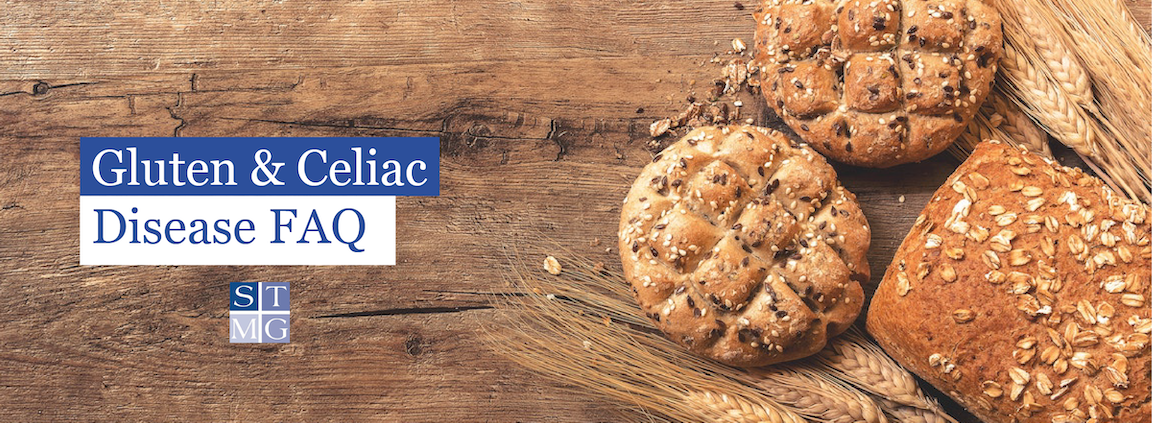FAQ: Your Gluten and Celiac Disease Questions Answered!
When it comes to gluten and celiac disease, many people have more questions than answers. Between fad diets, online supplements, and health claims that run the gamut from too-good-to-be-true to downright scary… how’s a person to know what to believe?
In an effort to better serve you, our patients, the gastroenterologists at Nashville’s St. Thomas Medical Group have put together this FAQ list covering the basics of celiac disease and gluten.
What is gluten?
Gluten is a protein found in wheat and many grains, including rye and barley. Gluten is what gives dough its sticky texture. While most common in wheat, rye and barley, gluten is also present in many foods that you wouldn’t expect due to food processing techniques. Even whole (non-gluten) foods, such as oats, may contain enough gluten to trigger symptoms. This can occur from contact in growing fields or processing plants.
What is celiac disease?
Celiac disease is an autoimmune disease and genetic disorder that is triggered by gluten. In patients with celiac disease, the ingestion of gluten triggers an autoimmune response in the body’s digestive system, resulting in the destruction of villi, tiny finger-like projections within the small intestine. Villi increase surface area inside the small intestine, making it easier for the body to properly absorb food. Fortunately, the interior lining of the small intestine renews itself every few days, so the damage caused by celiac disease is not permanent.
Remember, it’s important to recognize celiac disease for what it is: an autoimmune disease. Celiac disease isn’t a food allergy or dietary choice.
How common is celiac disease?
The Center for Celiac Research and Treatment reports that one out of every 133 people in the United States are affected by celiac disease.
What are the symptoms of celiac disease?
Symptoms of celiac disease may include constipation, diarrhea, abdominal pain, weight loss, fatigue, and more. Altogether, there are approximately 300 known symptoms of celiac disease. Many symptoms are “extra-intestinal,” which is to say they occur in body systems beyond the digestive system. Some patients may experience arthritis, joint pain, dementia, and other symptoms. That being said… some individuals with celiac disease experience no symptoms at all.
How is celiac disease diagnosed?
The initial screening for celiac disease can be done with a simple blood test, which detects specific antibodies. If the blood test indicates the possibility of celiac disease, then your gastrointestinal specialist may order an intestinal biopsy. Biopsy is the only way to make an official diagnosis.
How is celiac disease treated?
While there is no cure for celiac disease, the goods news is that affected individuals can lead normal, healthy lives by following a gluten-free diet.
What can I eat if I have celiac disease? What foods should I avoid?
Individuals with celiac disease can eat any foods that do not contain gluten. Avoid any foods that contain wheat or wheat-derived flour. This includes bread, pasta, and cereals, as well as foods you might not expect to contain gluten: canned soup, ketchup and mustard, processed meats, ice cream, and yogurt. (Due to increased awareness of celiac disease, gluten-free options are now available for nearly every food.)
Is celiac disease a major health concern? Is it dangerous?
Yes, biopsy-diagnosed celiac disease is a major health concern. Left untreated, the effects can be life-threatening. Untreated celiac disease may increase risk for cancer, osteoporosis, pancreatic disease, malabsorption, hemorrhaging, and other serious health issues.
If you have celiac disease, talk to your doctor or gastrointestinal specialist about following a proper gluten-free diet.
Schedule An Appointment With a GI Specialist
For more information, visit the St. Thomas Medical Group Endoscopy Center (phone +1 (615) 301-7040) or Nashville Gastrointestinal Specialists (phone +1 (615) 383-0165).



